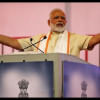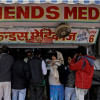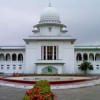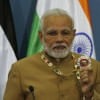Modi on twin missions

Indian Prime Minister Narendra Modi's scheduled visit to Bangladesh will not just be confined to attending the 'Mujib Borsho' celebration, he will tie up some loose ends of his script for the high-octane West Bengal polls.
As per his programme schedule, the Indian premier is expected to visit a sacred shrine of "Matua" community at Orakandi in Gopalganj district, a move the political analysts believe is aimed at wooing hearts of the Matuas across the border.
On his arrival in Dhaka on March 26, Modi will fly off to Orakandi on March 27, the day when West Bengal goes to the first of the eight-phase elections. Modi will pay respect to Harichand Thakur, the founder of the Matua sect, who was born there on March 11, 1812.
But why is the Matuas important in West Bengal's assembly election?
Analysts say Modi will be the first Indian prime minister ever to visit Orakandi, an emotional place for 1.5 crore voters in West Bengal. Around over 3.5 crore Matua people live across the state.
The politically active community is a decisive factor in 30 out of the total 294 assembly constituencies. Besides, it has indirect influence in around 63 seats, they say.
Through his visit to the shrine, Modi will try to woo this Matua vote bank, who became somewhat frustrated with the non-implementation of the Citizenship Amendment Act (CAA), the analysts say.
"Modi's visit to Orakandi is very political. He is going there to woo the Matua voters," Biswanath Chakraborty, a professor of political science at Rabindra Bharati University in India, told The Daily Star by phone.
Matuas are affiliated with different political parties, he said, adding the political parties are making different promises to them, although the community does not hold much influence.
But Mahitosh Baidya, general secretary of All India Matua Mahasangha, does not think so.
"The visit of our prime minister to Orakandi ahead of the assembly polls will definitely influence Matua voters to vote for the BJP," he told this paper.
"The whole Matua community is happy and overwhelmed as the PM is going to visit the Orakandi shrine," he added.
On the other hand, Matuas at Orakandi are fully prepared to receive the Indian premier. They said they are happy as Modi is coming to their shrine.
"We are excited as well as fully prepared to welcome Modiji. His visit will create emotion within the whole Matua community," Subrata Thakur, executive president of Matua Mahasangha, told The Daily star.
Asked whether the visit is linked with the West Bengal polls, Subrata, also Kashiani upazila chairman, declined to make any comments.
Replying to another question, he said nearly one crore Matua people are estimated to be living in Bangladesh now.
Matua, a sect of folk Hinduism who are Namasudras, a scheduled caste group, spread across the districts of North 24 Parganas, South 24 Parganas, Nadia and smaller parts of Jalpaiguri, Siliguri, Cooch Behar and Bardhaman.
The refugee community left the then East Pakistan (Now Bangladesh) after the partition in 1947 and migrated to West Bengal.
Matua vote bank became a major factor for West Bengal Assembly polls from 2011 when the community paved the way for the Trinamool Congress, headed by WB chief Minister Mamata Banerjee, to capture the state in 2011.
In that election, Mamata and her Trinamool Congress (TMC) ousted Left-Front by defeating Communist Party of India (CPM) after 34 years. Previously, Matuas were the supporters of CPM.
In the 2014 Lok Sabha polls and in the 2016 Assembly Elections, TMC ruled the area with the blessings of late Binapani Devi, popularly known as 'Boro ma' among her followers in Matua community. Mamata was close to Binapani Devi.
But things changed in the 2019 Lok Sabha elections when the majority of Matua voted for BJP after Modi promised them of giving citizenship.
Take the example of Santanu Thakur, the present leader of the Matua Mahasangha
An incumbent BJP MP, he defeated his aunt and Trinamool Congress' heavyweight candidate Mamata Thakur in the Bongaon seat, bagging nearly 65-67 percent Matua votes. He became the first non-TMC MP from the community in the 2019 Lok Sabha elections.
Santanu's father Manjul Krishna Thakur was a former minister in the state.
The promise of the CAA was one of the major factors in the BJP's rise and it won the confidence of the Matuas.
However, in recent days, Matuas became frustrated over not implementing the CAA that aims to grant citizenship to non-Muslim migrants who moved to India from neighbouring countries to escape religious persecution.
As a result, Santanu is now in an odd situation over the delay in the implementation of CAA in West Bengal. He cautioned the BJP-led government that if CAA was not fulfilled immediately, the community would be "forced to make a fresh call".
Thakur's warning forced Indian Home Minister Amit Shah to visit Thakurnagar, an area dominated by people belonging to Matua community, under North 24 Parganas last month.
During his visit, he assured the community that the CAA would be implemented once the vaccination against Covid-19 was completed.
Against the backdrop, Modi will try to woo the Matua voters and send across a political message from Bangladesh to these electorates, said political analysts.
Biswanath Chakraborty, however, thinks the visit will not have much of an impact on the community.
"The way BJP is pinning hope on the Matua voters, I don't think Modi's visit will create that much impact on them," he said, citing how things have unfolded lately.
According to Modi's two-days schedule, on March 26, he will pay honour to the martyrs of the country's liberation war at the National Martyrs' Memorial in Savar and deliver a speech at the National Parade Ground as a guest of honour.
In the evening, Prime Minister Sheikh Hasina and her Indian counterpart Narendra Modi will inaugurate the Bangabandhu-Bapu Digital Exhibition. On the next day, Modi will pay respect at the Bangabandhu Memorial at Tungipara in Gopalganj and will also visit two temples -- one in Satkhira and Orakandi.
On March 27 afternoon, the two premiers will hold a meeting and will also inaugurate two memorial post tickets. Modi will meet President Abdul Hamid at his office before leaving for Delhi the same night.

 For all latest news, follow The Daily Star's Google News channel.
For all latest news, follow The Daily Star's Google News channel. 








Comments